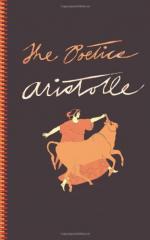
|
| Name: _________________________ | Period: ___________________ |
This test consists of 15 multiple choice questions and 5 short answer questions.
Multiple Choice Questions
1. If the characters conquer the problem, how does Aristotle say the tragedy ends?
(a) Sadly.
(b) Without pity.
(c) Happily.
(d) It ends too soon.
2. How does Aristotle characterize tragedies with happy endings?
(a) He says they are Roman poetry.
(b) He calls them great tragedies.
(c) He says they are Greek poetry.
(d) He calls them comedies.
3. Aristotle explains that a sign is one of four types of recognition. What is an example of recognition occurring through the use of a sign?
(a) A character recognizes another by a certain scar or birthmark.
(b) A character has a vivid dream.
(c) A character's action is interrupted by what seems to be divine intervention.
(d) A character receives a psychic reading.
4. What does Aristotle say that a well-crafted tragedy has?
(a) Excellent irony.
(b) Consistent foreshadowing.
(c) A masterfully written complication and unraveling.
(d) Powerful characters with morals.
5. In a good tragedy, Aristotle explains that the misfortune the main character experiences is usually caused by what?
(a) The character's weakness.
(b) Stupidity.
(c) Misguided love.
(d) The character's arrogance.
6. What would Aristotle say about the following action: a man is about to kill his brother, thinking him to be his enemy, but discovers his identity and therefore spares his life?
(a) Poor plot development.
(b) An interesting turn of events.
(c) The most successful kind of action.
(d) Poor execution.
7. Concerning what Aristotle says about the conclusion of a tragedy, which of the following statements is FALSE?
(a) The characters can conquer the problem.
(b) The story can end happily.
(c) The characters always resolve the issues and harmony is restored.
(d) The problem can conquer the characters and the story ends unhappily.
8. If the problem conquers the characters, how does Aristotle say the tragedy ends?
(a) Happily.
(b) Unhappily.
(c) Successfully.
(d) It ends just at the right time.
9. Aristotle asserts that the main character of a tragedy must have what?
(a) Complete confidence.
(b) A tragic past.
(c) Weakness.
(d) A lot of money.
10. If the story is performed, why, according to Aristotle, should actors act with appropriate gestures to demonstrate their emotions and thoughts as the story progresses?
(a) Aristotle says that spectators will not be able to infer these simply from the dialog alone.
(b) Aristotle says that gestures compensate for a bad story.
(c) None of the answers is correct.
(d) Gestures are more important than dialogue.
11. In addition to a sign, what is the second kind of recognition as identified by Aristotle?
(a) A psychic reading.
(b) A bad dream.
(c) Divine intervention.
(d) One that occurs simply by the will of the poet.
12. Based on Aristotle's teachings about tragedy, how can the poet unify the plot?
(a) Establishing clear relationships between actions the rest of the plot.
(b) Use more verbs.
(c) Develop characters who behave in a believable manner.
(d) Use complete sentences.
13. When constructing the plot, the poet ought to do what first, according to Aristotle?
(a) Develop the ending of the story.
(b) Fill out the individual episodes and scenes.
(c) Develop the beginning of the story.
(d) Outline the plot in totality.
14. Aristotle warns that a tragedy poet should be careful with what?
(a) Writing the middle, as it is the most important part of a tragedy.
(b) Picking the content for the poem.
(c) The poet should be careful not to write a happy ending.
(d) Choosing ironic events.
15. What does Aristotle believe to be the goal of tragedy?
(a) To inspire fear.
(b) To inspire fear and pity.
(c) To inspire pity.
(d) To inspire anger.
Short Answer Questions
1. Into how many parts does Aristotle divide the plot of a tragedy?
2. In a tragedy, Aristotle says that the main character cannot be what?
3. Aristotle says that an action that is failed to be performed in a tragedy by the person who is aware of the circumstances is what?
4. Aristotle explains that tragedies should have what that other poems do not?
5. In a tragedy, Aristotle warns that the poet must NOT choose a character who is altogether what?
|
This section contains 668 words (approx. 3 pages at 300 words per page) |

|




